|
|
|
Sort Order |
|
|
|
Items / Page
|
|
|
|
|
|
|
| Srl | Item |
| 1 |
ID:
166319
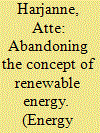

|
|
|
|
|
| Summary/Abstract |
Renewable energy is a widely used term that describes certain types of energy production. In politics, business and academia, renewable energy is often framed as the key solution to the global climate challenge. We, however, argue that the concept of renewable energy is problematic and should be abandoned in favor of more unambiguous conceptualization.
|
|
|
|
|
|
|
|
|
|
|
|
|
|
|
|
| 2 |
ID:
166317
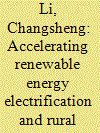

|
|
|
|
|
| Summary/Abstract |
The rural developing world faces a significant challenge in achieving the dual objectives of economic growth and decarbonization. An innovative business model tested in China that combines the use of solar photovoltaics (PVs) and agricultural greenhouses offers a solution to meeting this challenge and can have the potential for global deployment. However, the traditional PV-greenhouse business model is facing growing difficulties with shrinking revenues due to declining feed-in-tariffs. This study discusses a new business model concept based on a case in which a local Chinese PV company has transformed its business model from a crop production business to a service platform. The study concludes that business model innovation for expanding PV-greenhouse functions can help PV agricultural companies effectively adapt their businesses to policy changes and that new supporting policies are needed in promoting PV-greenhouse integration, adopting financial supporting measures, and facilitating grid integration of PV.
|
|
|
|
|
|
|
|
|
|
|
|
|
|
|
|
| 3 |
ID:
166305


|
|
|
|
|
| Summary/Abstract |
Keeping homes at a comfortable temperature and reducing household fuel bills are priorities for many governments. In the UK, several interventions have been implemented to achieve these objectives. This paper investigates one such policy lever - the Energy Price Cap - to understand if it has been designed and implemented efficiently and equitably. The price cap was introduced for customers on prepayment meters to combat increased levels of fuel poverty and a lack of competition in this group. However, the price cap was based on several assumptions of how energy is used. In this work, we assess how well the price cap accounts for real energy use using smart meter data. Households on economy 7 (EC7) tariffs were found to spend more than those on standard rate tariffs, as EC7 customers use more electricity during peak hours than assumed in government calculations. Additionally, many of the EC7 customers in this sample still use a considerable amount of gas, suggesting the EC7 heating product is either not sufficient, or is not being utilised in a cost-effective manner. Revisions to the input assumptions in government models for EC7 customers would therefore be beneficial in future price cap levels.
|
|
|
|
|
|
|
|
|
|
|
|
|
|
|
|
| 4 |
ID:
166302
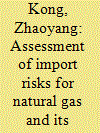

|
|
|
|
|
| Summary/Abstract |
China's growing dependence on foreign natural gas has garnered increased attention to import risks and exposure. The purpose of this study is to serve as a vital guide in formulating an energy policy framework that aims at assessing and mitigating the impacts of natural gas import risks (NGIR). First, the paper constructs a NGIR evaluation framework with full consideration of resource risk, political risk, transport risk, price volatility risk, purchasing power risk and dependence risk. The relative weight of various risk factors is also identified for importing gas from different sources. Building on this, we use a linear programming model to optimize China's gas import sources based on the minimization of import risks. The results show that China's NGIR exhibited increasing trends in 2010–2014, with variation in the largest risk factors by national gas supplier. For Turkmenistan and Indonesia, the greatest risk is dependence; for Qatar, price volatility risk; for Yemen, Australia and Uzbekistan, resource risk; and for Malaysia, purchasing power risk. Along with other policy recommendations, our optimization results indicate that increasing the proportion of Chinese gas imports from potential suppliers, such as Russia and the United States, is an effective approach to reduce NGIR.
|
|
|
|
|
|
|
|
|
|
|
|
|
|
|
|
| 5 |
ID:
166307


|
|
|
|
|
| Summary/Abstract |
A number of studies show that large-scale deployment of Carbon Capture and Storage (CCS) is necessary to limit the increase in global average temperature to less than 2 °C by 2100. However, some experts and citizens worry about the integrity of carbon dioxide storage sites due to the possibility of future leakage. We introduce a two-period model where two emission mitigation technologies are available to society in the first period: CCS, with a risk of carbon dioxide leakage in the second period, and a riskless mitigation alternative, such as renewable energy. We first solve the model assuming that society does not know what the future rate of leakage will be. We then solve the model assuming that society will eventually learn the actual leakage rate. We find that, in a trading market in period one, reductions of CO2 emissions through CCS should generate a less than proportional amount of CO2 allowances. Estimates from simulations, using a coarse range of parameters, indicate that the discount factor of CCS allowances lies in the range (0.72, 1). Site-specific data is required to determine site-specific risks of leakage and discount factors.
|
|
|
|
|
|
|
|
|
|
|
|
|
|
|
|
| 6 |
ID:
166334
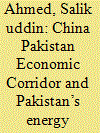

|
|
|
|
|
| Summary/Abstract |
China Pakistan Economic Corridor has been touted by many as a gateway to economic prosperity and stability in Pakistan. It accompanies great potential in terms of solving the ongoing energy crisis and eventually leading Pakistan towards energy security. In this respect, a meta-analytic review has been conducted to identify the underlying concerns that can hinder the successful achievement of energy security though China Pakistan Economic Corridor energy projects. This meta-analysis has revealed strong evidence supporting achievement of Pakistan's energy security dream (89%) along with five main distressing factors which are economic burden (22.22%), security threat (38.89%), project completion delays (22.22%), lack of project feasibility studies (22.22%) and provincial conflict (50%). Additionally, statistically significant strong negative correlation between energy security and economic burden is unearthed with Spearman's rho-value of − 0.759. Moreover, strong negative correlation exists between energy security and project completion delays with rho-value of − 0.500 and P-value of 0.035. Also, project feasibility and project completion delays is found to have a very strong positive correlation as well with rho-value of 0.709 and P-value of 0.001. These findings will assist policy makers and strategists in formulating limitation frameworks for the restriction of undesirable influences on energy security from these identified factors.
|
|
|
|
|
|
|
|
|
|
|
|
|
|
|
|
| 7 |
ID:
166335
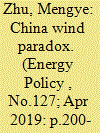

|
|
|
|
|
| Summary/Abstract |
China has seen a surge in wind power installation over the past decade, and is now the world leader in installed capacity. However, wind curtailment – i.e., when the power grid frequently interrupts the power connection of installed wind capacity – has become an increasingly serious problem. But despite wind curtailment significantly jeopardizing wind power developers’ profitability in China, companies have continued to invest. This study, based on extensive interviews with decision-makers in China's Central State-Owned Enterprises (CSOEs), attempts to explain this seeming paradox. Since the majority of wind power investment in China has been made by CSOEs, previous findings of SOE studies assume that this continued investment abjures “economic rationality” due to political/policy burdens. However, this study shows that this is not necessarily accurate. CSOEs’ investment behavior also accords with market logic, as they competed fiercely over wind power sites, increasing investment scale as a rational long-term strategy of profitability. We also find that the embrace of market logic by CSOEs has resulted from recent economic and power sector reforms. For a more efficient market, policy-makers must pay greater attention to the quality of competition among CSOEs.
|
|
|
|
|
|
|
|
|
|
|
|
|
|
|
|
| 8 |
ID:
166296


|
|
|
|
|
| Summary/Abstract |
This study proposes comprehensive evaluation criteria, involving aspects of energy, economy, environment, technology, and society (E3TS), for the development and utilization of renewable energy (RE). The criteria consist of 22 indicators. The comprehensive performance, from 2011 to 2015, of 30 provincial regions in China with respect to renewable energy development and utilization (REDU) was evaluated on the basis of the E3TS criteria, using an analytic network process (ANP). The results show that the total comprehensive performance (2011–2015) of all the 30 provincial regions of China improved in general. There was a marked improvement in technology performance. Qinghai, Yunnan, and Sichuan ranked the top three in comprehensive performance of REDU, while the comprehensive performance of Shaanxi, Hainan, and Henan were the lowest. During the study period, while the comprehensive performance of most provincial regions such as Ningxia and Xinjiang increased, that of five provincial regions, including Tianjin and Hainan, decreased. The regional comprehensive performance was severely affected by the installed capacity and power generation of RE.
|
|
|
|
|
|
|
|
|
|
|
|
|
|
|
|
| 9 |
ID:
166300


|
|
|
|
|
| Summary/Abstract |
We investigate the economic impacts of policies for coordinating electricity production in the Gulf Cooperation Council (GCC) through electricity trade. The GCC countries have installed a network of high-voltage transmission lines that links Saudi Arabia, Bahrain, Kuwait, Oman, Qatar, and the United Arab Emirates. The Interconnector has successfully provided reliability services but has not yet realized its full potential as a platform to fully integrate the individual electricity systems.
|
|
|
|
|
|
|
|
|
|
|
|
|
|
|
|
| 10 |
ID:
166338


|
|
|
|
|
| Summary/Abstract |
Ambitious goals for climate change mitigation and energy security policies are driving deployment of renewable energy sources globally. However, the deployment of renewable energies at scale requires not only public but also private capital, such as foreign direct investment (FDI). Many countries with favourable conditions for renewables, such as the countries of the Middle East and North African (MENA) region, are not attracting sufficient FDI. Risk perceptions of FDI stakeholders are one of the reasons. This paper discusses the de-risking approach as a possible tool to address subjective risk perceptions and assesses with a Computable General Equilibrium (CGE) model macroeconomic feedback-effects of employing a de-risking strategy for FDI into a particular kind of renewable electricity (RES-E) technology, concentrated solar power, in the MENA region. Our results show that the application of a de-risking approach reduces the costs for deployment of CSP, and therefore, also volumes of subsidies that would be needed to make CSP cost competitive with fossil fuel based electricity generation. This, in turn, leads to positive GDP and welfare effects in the MENA region. Our results allow us developing of recommendations for energy policy the implementation of the de-risking approach as a potential consensual option with high political feasibility to reduce climate change mitigation costs.
|
|
|
|
|
|
|
|
|
|
|
|
|
|
|
|
| 11 |
ID:
166297
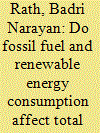

|
|
|
|
|
| Summary/Abstract |
This study examines whether types of energy consumption affects the total factor productivity (TFP) growth. Using annual data of 1981–2013 for the panel sample of 36 countries, the results show that fossil fuel consumption declines the TFP growth, whereas, renewable energy consumption boosts the TFP growth. However, the results vary across different sub-panels. Further, the results from panel Granger causality support the feedback hypothesis in the long-run, whereas, weak evidence is found in the short-run. Since our findings supported feedback hypothesis, thus, policy should focus on reducing fossil fuel and using more renewable energy for achieving a ‘‘win-win’’ position of sustainable higher productivity growth with protective environmental quality in the long-run.
|
|
|
|
|
|
|
|
|
|
|
|
|
|
|
|
| 12 |
ID:
166329
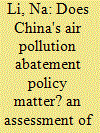

|
|
|
|
|
| Summary/Abstract |
This paper assesses the impact of China's air pollution abatement (APA) policies on both the economy and environment in the Beijing-Tianjin-Hebei (BTH) area, using a multi-regional energy-environment-economy computable general equilibrium (CGE) model incorporating the direct abatement expenditure of the proposed policies.
|
|
|
|
|
|
|
|
|
|
|
|
|
|
|
|
| 13 |
ID:
166324


|
|
|
|
|
| Summary/Abstract |
A three-year field experiment was conducted with 185 prosperous households to assess whether behavioural interventions by a community environmental group during and after thermal upgrades (cavity wall and/or loft insulation) can achieve reductions in households’ energy use, including reductions in direct and indirect rebound. The engineering interventions on the thermal efficiency of dwellings appear effective in reducing energy use in both treatment and control groups: a direct rebound effect is estimated to be at most 40 per cent from the engineering interventions. However, across a range of measures of energy use, we observe no significant effect of the community behavioural intervention across the total lifetime of the project. Qualitative data collected on similar community groups suggests substantial constraints on their capacity to realise reductions in energy use amongst households.
|
|
|
|
|
|
|
|
|
|
|
|
|
|
|
|
| 14 |
ID:
166306


|
|
|
|
|
| Summary/Abstract |
This paper examines market structure, regulation, and market performance of the Dutch electricity retail market for households since its opening in 2004. Using data containing monthly prices for all products offered in the Dutch retail electricity markets over the period 2008–2014, we provide quantitative results on the intensity of retail competition and the benefits to consumers. Regulation of the retail electricity market is relatively intensive and encompasses structural measures, contractual restrictions, rules on information provision, price surveillance and market monitoring. In contrast to most other countries, the Dutch regulation includes a kind of price regulation which is that the regulator surveys all new retail prices before market introduction in order to prevent too high retail prices. The Dutch retail electricity market has remained relatively concentrated, with retailers offering an increasing variety of retail products, often using multiple brands. Competition is characterized by product innovation, especially for green energy, rather than price competition on homogenous products. Gross retail margins remain relatively high, as is price dispersion across retailers. The market matured, as evidenced by fewer consumer complaints and higher switching rates.
|
|
|
|
|
|
|
|
|
|
|
|
|
|
|
|
| 15 |
ID:
166301


|
|
|
|
|
| Summary/Abstract |
Singapore began a huge step to deregulate its electricity market since 2003, with the creation of the National Electricity Market of Singapore (NEMS) allowing for bid-ask offers to be made for the dispatch of electricity supply on the wholesale side. Subsequently, the retail market liberalised in tranches, with 80% of electricity consumers currently already given an option to select their electricity retailers since late 2014. This paper aims to quantitatively analyse how competitiveness in both the wholesale and retail market led to price decreases from 2014 to 2017, using daily data for electricity and oil prices. We find that supply competition and the more recent retail liberalisation efforts has possibly led to a combinatorial decrease in wholesale electricity prices by up to 9.11%, accounting for the influence of oil prices and volatility components. This work seeks also to bring some insights on what to expect from full retail contestability after the latter half of 2018.
|
|
|
|
|
|
|
|
|
|
|
|
|
|
|
|
| 16 |
ID:
166340
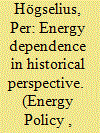

|
|
|
|
|
| Summary/Abstract |
Studies of energy and geopolitics have been almost totally monopolized by analyses of the largest and most powerful countries in the world. This article argues that it is crucial to include the world's smaller and less powerful nations, too, into the analysis. Adopting a systems perspective, the article discusses Europe's smaller nations that have come to depend on other countries for various activities relating to their fuel supplies, and how they have sought to cope with these dependencies over time. It discusses, in particular, two overarching strategies in this context: first, investments in domestic energy sources, and secondly, efforts to cope with – rather than to reduce – energy imports. Smaller nations have often been more dependent and more vulnerable than the larger countries in the geopolitical energy arena. However, there are numerous exceptions to this pattern, especially in terms of the critical hub positions that a range of smaller nations have managed to secure in the international energy trade. Furthermore, Europe's smaller countries have had a more narrow range of methods at their disposal than the larger countries when it comes to coping with energy dependence – but perhaps not as narrow as commonly believed.
|
|
|
|
|
|
|
|
|
|
|
|
|
|
|
|
| 17 |
ID:
166342


|
|
|
|
|
| Summary/Abstract |
Energy performance certificates (EPC) were introduced in European Union to support reaching energy efficiency targets by informing actors in the building sector about energy efficiency in buildings. While EPC have become a core source of information about building energy, the domains of its applications have not been studied systematically. This partly explains the limitation of conventional EPC data quality studies that fail to expose the essential problems and secure effective use of the data.
|
|
|
|
|
|
|
|
|
|
|
|
|
|
|
|
| 18 |
ID:
166298
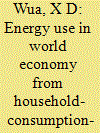

|
|
|
|
|
| Summary/Abstract |
An overview for energy use within the world economy as reflected by the Eora database for 2012 is conducted by means of household-consumption-based multi-regional input-output analysis that is parallel to existing energy accounting frameworks. From a household-consumption-based perspective, the energy use for Mainland China economy is only around half of that for the United States. The world's trade volume of energy use associated with consumer products is quantified, which is over one-fifth of the global total energy consumption. Mainland China is revealed to be with the largest trade deficit of energy use, in magnitude up to the summation of the trade imbalance of all other major economies. Heavy industry products shipped to Europe & Eurasia, Asia Pacific and North America account for nearly 80% of Mainland China's exports of energy use. To safeguard sustainable energy use, the developed economies are suggested to further strengthen their comparative advantages in those high value-added goods or services while developing economies such as Mainland China are supposed to alter the trade patterns by a transition of economic structure.
|
|
|
|
|
|
|
|
|
|
|
|
|
|
|
|
| 19 |
ID:
166304


|
|
|
|
|
| Summary/Abstract |
Energy efficient lighting confers significant potential in electricity demand reduction. To increase the diffusion of energy efficient lighting, an LED Replacement Lamps Program is proposed. Free of charge LED lamps are suggested to be distributed to households by government to reduce household electricity demand. Because electricity is heavily subsidized in Iran, the direct benefit of the program for the government will be avoiding the energy subsidy payments. Back-of-the-envelope benefit cost analysis suggests that if potential electricity savings are realized, the program will be profitable. However, the possible rebound effect may negatively impact the program effectiveness through partially offsetting the potential electricity savings. Therefore, the viability of the program depends on the actual electricity savings that may differ from its anticipated levels. A hybrid dynamic general equilibrium model is employed to evaluate the actual economy-wide energy savings. The model has the novelty of endogenously calculating useful energy demand (e.g. lighting, cooling). Energy demand is then derived based on end-use efficiency and useful energy demand. Model results indicate an average economy-wide rebound of 43.8%. Even though the rebound value is high, the program is shown to be profitable.
|
|
|
|
|
|
|
|
|
|
|
|
|
|
|
|
| 20 |
ID:
166316


|
|
|
|
|
| Summary/Abstract |
Understanding public perception is critical to developing effective policies for nuclear energy. This study conducted focus group discussions with the Thai and Vietnamese public to understand their trust in potential stakeholders, benefit perception, risk perception, and acceptance of nuclear energy. The participants in both countries preferred economic benefits, such as boosting national development to environmental benefits. Participants perceived nuclear accidents as a major risk, but such perceptions were sometimes based on misunderstandings. The findings suggested that participants evaluated trust toward relevant stakeholders based on their expertise, transparency, and empathy. Overall, participants indicated that their respective countries were not ready for nuclear energy: The Thais thought that their government should heighten public education on nuclear energy, while the Vietnamese thought that their country lacked expertise for managing nuclear power plants. This study also highlights the theoretical and policy implications for nuclear energy development in Southeast Asia. Directions for future studies were discussed.
|
|
|
|
|
|
|
|
|
|
|
|
|
|
|
|
|
|
|
|
|